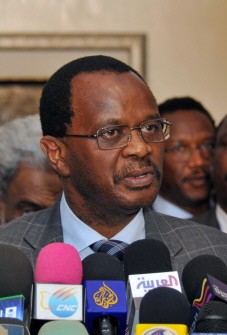The two holes where the bullets entered Sudanese refugee Abseta Afalla's calf are still raw, a grim reminder from the boiling civil war in Sudan's Blue Nile state he fled from.

It still pains him to walk on his wounded leg, so he spends most of his days lying in his tent in this refugee camp in Ethiopia, close enough to the border to still hear the sound of regular aerial bombings in the distance.
"I am not happy at all, I was shot, so I had to leave for Ethiopia, but my colleagues are still there," said Afalla, aged 33.
He was shot when infighting broke out in his army unit, when troops loyal to the Khartoum government turned on former rebels, uneasily living side-by-side.
Now all he wants is for his leg to heal so he can go back and fight.
Over 27,000 people have fled into South Sudan and Ethiopia since fighting erupted in Blue Nile last month, with refugees reporting both regular airstrikes and ground attacks.
The United Nations expects the number of new arrivals to swell in the coming weeks, as fighting continues between Sudanese troops and Sudan People's Liberation Army-North (SPLA-N) fighters in the border region.
The SPLA-N once fought alongside South Sudanese rebels during their 22-year conflict with Khartoum, but the South's independence in July meant their brothers-in-arms in Blue Nile were abandoned in the rump state of Sudan.
Many international organisations are restricted from entering Blue Nile, but aid workers fear thousands have been killed, with rebels estimating up to half of Blue Nile's 1.2 million people have already been displaced.
Many of them are settling in Ethiopian towns near the Sudan border, including Gizan, where over 2,100 refugees are living.
The UN refugee agency (UNHCR) is encouraging them to move into camps where they can receive food rations and health care, but many refuse, unwilling to accept that the conflict may drag on much longer.
"I can't stop thinking about my village," said refugee Atoma Anur, aged 18. "When Sudan is peaceful, we will go back."
Anur settled in an abandoned school in Gizan along with about 30 other refugees.
She gave birth in the school, with no doctor or medical supplies at hand. Like many other refugees in Gizan she relies on food handouts from friends, but food supplies are low in the small, sun-scorched village.
Anur fled Sudan after hearing heavy fighting nearby. Scared and pregnant, she walked six hours into Ethiopia, leaving her husband behind to fight with the rebels.
"We never saw anything, but we heard the guns, and I was afraid," she said, lying with her newborn baby next to a jug of murky brown drinking water.
She said she might go into a UN-run camp soon, as food becomes scarce in Gizan, with new camps nearby due to open before the end of the month.
"This is going to be a protracted thing, I think these refugees will be here for quite a while," said Richard Ewila, a UNHCR official.
An increasing number of refugees arriving at the camp are unaccompanied children.
Peter Daoud, 13, fled his village when soldiers stormed his village in the middle of the night, leaving his relatives behind.
"When the attack happened it was difficult to see. Many people were running and screaming and crying," he said from a tent in Sherkole, where he plays a game of cards with three other teenage boys who also arrived alone.
"I had no one, no father, no brother, so I cried," he said sadly.
He has no plans to return to Sudan, he said. Instead, he only wants to go to school, which he has started since arriving in Sherkole last month.
But aid agencies warn that resources are stretched thin, as they cope with a separate refugee crisis in southeast Ethiopia, with tens of thousands Somalis arriving at the Dolo Ado camp in recent months fleeing drought and conflict.
"There is a huge emergency in Dolo Ado and a huge emergency here, so we're stretched," said UNHCR officer in Sherkole, Irene van Rij.
The Food and Agriculture Organisation has also warned of a looming food crisis in Blue Nile as a result of erratic rains and food shortages, which could increase the number of people seeking refuge in Ethiopia.
The refugees say they want to go home, but fear there will be no quick end to conflict there.
"If there is peace, I will go back," said Afalla. "But I am not sure when that will be."
























